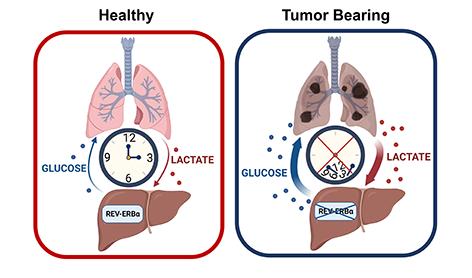New study identifies possible therapeutic target to suppress cancer cell growth
Irvine, CA – June 25, 2021 – New research from the University of California, Irvine reveals how the circadian regulation of glucose production in the liver is lost during lung cancer progression, and how the resulting increase in glucose production may fuel cancer cell growth.
The new study titled, “Glucagon regulates the stability of REV-ERBα to modulate hepatic glucose production in a model of lung cancer-associated cachexia,” published today in Science Advances, illustrates how the circadian clock is regulated under conditions of stress such as during lung cancer progression and cancer-associated tissue wasting disease called cachexia.
“Our research shows that a critical circadian protein, REV-ERB?, controls glucose production in the liver. During lung cancer progression and specifically under conditions of cachexia, this circadian regulation is lost, resulting in increased glucose production from the liver,” said senior author Selma Masri, PhD, assistant professor in the Department of Biological Chemistry at UCI School of Medicine. “Based on our findings, we identified that lung tumors are able to provide instructive cues to the liver to increase glucose production, a major fuel source for cancer cells.”
This research places the circadian clock as a central regulator of glucose production during lung cancer progression and provides important insight toward the development of novel therapeutics to target REV-ERB? to suppress cancer cell growth.
“We are continuing to investigate the consequence of increased glucose production during lung cancer progression by tracing the metabolic fate of this newly generated glucose to determine if this fuel source can drive the heightened metabolic demand of lung cancer cells,” said Amandine Verlande, PhD, and Sung Kook Chun, PhD, postdoctoral scholars in the Masri Laboratory.
The circadian clock is our intrinsic biological pacemaker that maintains physiological homeostasis in all tissues of the body. Under conditions of stress, the biological clock is rewired as an adaptive mechanism to maintain synchrony and equilibrium throughout the body.
###
This research was supported in part by the National Institutes of Health, Concern Foundation, V Foundation for Cancer Research, Cancer Research Coordinating Committee, and shared resources supported through the UCI Chao Family Comprehensive Cancer Center.
About the UCI School of Medicine
Each year, the UCI School of Medicine educates more than 400 medical students, and nearly 150 doctoral and master’s students. More than 700 residents and fellows are trained at UCI Medical Center and affiliated institutions. The School of Medicine offers an MD; a dual MD/PhD medical scientist training program; and PhDs and master’s degrees in anatomy and neurobiology, biomedical sciences, genetic counseling, epidemiology, environmental health sciences, pathology, pharmacology, physiology and biophysics, and translational sciences. Medical students also may pursue an MD/MBA, an MD/master’s in public health, or an MD/master’s degree through one of three mission-based programs: Health Education to Advance Leaders in Integrative Medicine (HEAL-IM), Leadership Education to Advance Diversity-African, Black and Caribbean (LEAD-ABC), and the Program in Medical Education for the Latino Community (PRIME-LC). The UCI School of Medicine is accredited by the Liaison Committee on Medical Accreditation and ranks among the top 50 nationwide for research. For more information, visit som.uci.edu.
Media Contact
Anne Warde
[email protected]
Original Source
https:/
Related Journal Article
http://dx.





